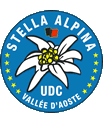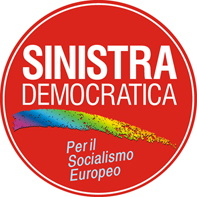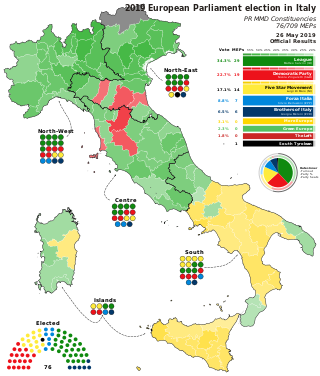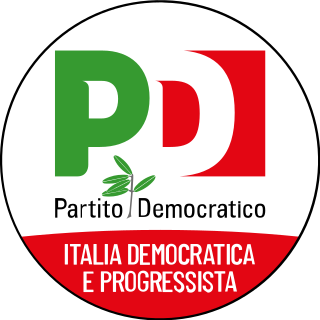
Italy of Values is a populist and anti-corruption political party in Italy. The party was founded in 1998 by former Mani pulite prosecutor Antonio Di Pietro, who entered politics in 1996 and finally left the party in 2014. IdV has aimed at gathering and giving voice to different sectors of the Italian society. From the beginning of its existence one of its major issues has been the so-called "moral issue". In the early 2010s, IdV was eclipsed by the new-born Five Star Movement, founded by comedian Beppe Grillo, which used the same populist and anti-corruption rhetoric.

The Italian Republican Party is a political party in Italy established in 1895, which makes it the oldest political party still active in the country. The PRI identifies with 19th-century classical radicalism, as well as Mazzinianism, and its modern incarnation is associated with liberalism, social liberalism, and centrism. The PRI has old roots and a long history that began with a left-wing position, being the heir of the Historical Far Left and claiming descent from the political thought of Giuseppe Mazzini and Giuseppe Garibaldi. With the rise of the Italian Communist Party and the Italian Socialist Party (PSI) to its left, it was associated with centre-left politics. The early PRI was also known for its anti-clerical, anti-monarchist, republican, and later anti-fascist stances. While maintaining those traits, during the second half of the 20th century the party moved towards the centre on the left–right political spectrum, becoming increasingly economically liberal.
Liberalism and radicalism have played a role in the political history of Italy since the country's unification, started in 1861 and largely completed in 1871, and currently influence several leading political parties.

The Democratic Party is a social democratic political party in Italy. The party's secretary is Elly Schlein, elected in the 2023 leadership election, while the party's president is Stefano Bonaccini.

Edelweiss is a regionalist, Christian-democratic political party active in Aosta Valley, Italy.
Democratic Republicans is a tiny liberal political party in Italy, led by Giuseppe Ossorio.

Democratic Left, whose complete name was Democratic Left. For European Socialism, was a democratic-socialist political party in Italy.

Movement for the Left was a socialist political party in Italy. It emerged as a split from the Communist Refoundation Party and later merged into Left Ecology Freedom. Its leader was Nichi Vendola.

AreaDem is a broad faction within the Democratic Party (PD), a political party in Italy. The faction coordinator is Marina Sereni, a former member of the Democrats of the Left close to Piero Fassino.

We the South, whose complete name is Freedom and Autonomy - We the South, is a regionalist political party in Italy based in the Campania but seeking to represent the whole South.
Popular Agreement was a small political party in Italy led by Giampiero Catone.

Article One, officially Article 1 – Democratic and Progressive Movement, was a social-democratic political party in Italy.
More Europe is a liberal and pro-European political party in Italy, part of the centre-left coalition and member of the Alliance of Liberals and Democrats for Europe Party.

The 2019 European Parliament election in Italy were held on 26 May 2019, electing members of the 9th Italian delegation to the European Parliament as part of the European elections held across the European Union.
Action is a liberal political party in Italy. Its leader is Carlo Calenda, a former minister of Economic Development.

Italia Viva is a liberal political party in Italy founded in September 2019. The party is led by Matteo Renzi, a former Prime Minister of Italy and former secretary of the Democratic Party (PD). As of 2021, Italia Viva is a member of the European Democratic Party.

The 2022 Sicilian regional election for the renewal of the Sicilian Regional Assembly and the election of the President of Sicily were held on 25 September, 2022. Renato Schifani, candidate of the centre-right coalition, easily won the election, becoming the next president of the region.

Democratic Party – Democratic and Progressive Italy is the parliamentary group of the Democratic Party (PD) and minor allied parties in the Chamber of Deputies and the Senate of the Republic, formed in October 2022. Prior to the formation of the group, its name was that of the lead electoral list of the centre-left coalition in the 2022 Italian general election.

The 2024 Piedmontese regional election was held on 8–9 June 2024. The election will elect all members of the Regional Council of Piedmont, as well as the president of Piedmont. It is the fourth election as part of the 2024 Italian regional elections and was held on the same day as the 2024 European Parliament election in Italy.
The 2024 European Parliament election in Italy to elect the delegation from Italy will be held on 8 and 9 June 2024. The outgoing MEPs are shown in italics.















